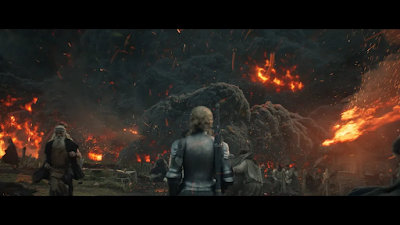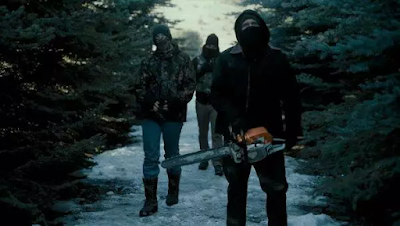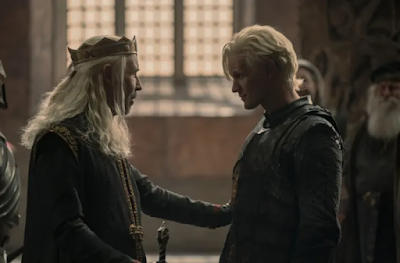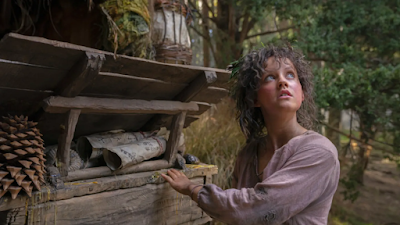This was the Helm's Deep battle scene from The Two Towers, complete with cavalry charge to save the day. The fact that it wasn't a suicidal cavalry charge down a 45 degree angle is a mild step forward, but it was still utterly obvious and borderline meme-worthy. Fantasy of any kind requires a suspension of disbelief. Most of the time, watching material that contains orcs, elves, magic swords, and kingly prophecies (as well as people of color with agency, if you're a bigot) requires you to accept that you're in a world that treats those things as normal. But there still has to be some degree of belief in the basic physical properties of the world. I was hard-pressed to stay with this very average screenplay when being forced to believe that not only did the forces of Numenór arrive from across the ocean at just the right moment, but they would be heading for that specific spot in the enormous area around the gigantic Orodruín in full armor and at a full charge. This is putting aside that they were earlier traveling at that same full gallop in full daylight while it was still dark where the rest of our characters were fighting Adar and his orcs. This was just short of Gendry running forty leagues in a couple hours and still somehow a) getting to where he needed to be and b) surviving. Dramatic timing is what it is because it's at least partially believable and somewhat surprising. This was neither of those things.
This is all after watching a series of action sequences that were neither particularly exciting nor suspenseful in any real fashion, since we've been in enough last-minute escapes/successes/moments of "tension" with Arondir to make him think he's the luckiest damn elf alive. (But, no, there's someone even luckier...) We also won't get into how the collection of average townsfolk were able to successfully sabotage a 100-foot tower to the point of collapse in just a few hours. There was so much of this episode that screamed the other kind of setup; not preparation, but putting the last domino in place so it all falls over in exactly the right fashion, that it seemed both trite and obvious from the opening moments. Nothing saps a story of energy faster than a scenario that makes you want to skip ahead to the (hopefully) genuinely exciting or interesting parts. Other than Adar detailing that the earliest of corrupted elves by Morgoth were called uruks (thus creating the baseline for the uruk-hai of Saruman in LotR and somehow different from the massive orks with that label who destroyed Osgiliath later in the Second Age) there was nothing compelling about this story whatsoever. In the end, we're saved from the evil sword being some kind of weapon of doom by being shown that it's actually the key to a set of locks to free the river Anduin to flow into the caverns below Orodruín and trigger its explosion. Locks built by whom, exactly? And why a sword? I mean, sure it's a setup(!) for creating the forgeworks that Sauron would later use to create the rings, but that seems like a rather elaborate story surrounding this dark weapon for it to end up being a mechanical tool for a hardly believable (even in elf and dark spirit world!) hydroengineering facility.
Nathan texted me earlier today, saying that this episode was largely a bunch of fantasy tropes and he's exactly right. The battle scenes, the forced emotion between Arondir and Bronwyn (complete with orchestra!), the cavalry saving the day, and even the soldier who's decided that one fight is enough for his lifetime when he's traveled halfway around the world to get here and was formerly trying to take a place in the Sea Guard. 'Obvious' and 'typical' don't begin to carry enough meaning to describe this script that apparently took no less than four people to complete. Part of that script is the continuing story of the invulnerability of Galadriel. We've already seen her trying to swim from Valinor without ill impact and now she's apparently unaffected by a pyroclastic flow, too. (I loved the call to "Get behind the wall!" Newsflash: That will not save you.) To draw another analogy, I've said for years that the reason Marvel's comics and films are so much more successful than DC's is because the former's characters are humans first, superheroes second, while the latter's are simply demigods. Since this is a story of a time long before LotR, we know that Galadriel won't die. But you also have to put your character in some degree of jeopardy for people to pay attention to her at all and we're now being shown that she is the most typical of superheroes, set up to be here week after week and issue after issue with the surrounding story having no impact whatsoever. You almost couldn't write something more uninteresting if you tried. This series' grip on me has gone from decent to very faint in the space of two weeks. I hope the last two can rescue it and, uh, not with cavalry.











































